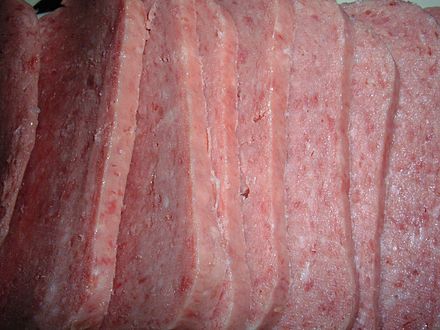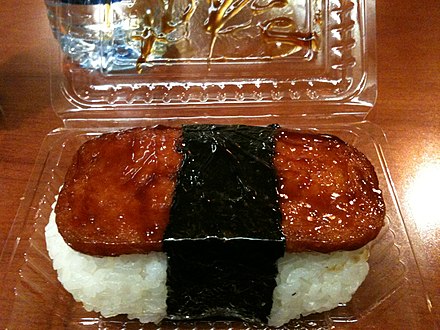Spam (food)
Spam (stylized as SPAM) is a brand of canned cooked pork made by Hormel Foods Corporation. It was introduced by Hormel in 1937 and gained popularity worldwide after its use during World War II.[1] By 2003, Spam was sold in 41 countries on six continents and trademarked in over 100 countries.[2]
Spam's basic ingredients are primarily pork shoulder and ham,[3] with salt, water, modified potato starch (as a binder), sugar, and sodium nitrite (as a preservative). Natural gelatin is formed during cooking in its tins on the production line.[4] Concerns about Spam's nutritional attributes have been raised, in large part due to its high content of fat, sodium, and preservatives.[5]
Spam has affected popular culture, including a Monty Python skit, which repeated the name many times, leading to its name being borrowed to describe unsolicited electronic messages, especially email.[6] It is occasionally celebrated in festivals such as Austin's Spamarama.
Spam was introduced by Hormel on July 5, 1937.[7] The Oxford Encyclopedia of Food and Drink in America states that the product was intended to increase the sale of pork shoulder, a cut which did not sell well.[7]
Ken Daigneau, the brother of a company executive, won a $100 prize that year in a competition to name the new item.[7] Hormel states that the meaning of the name "is known by only a small circle of former Hormel Foods executives", but a popular belief is that the name is a contraction of "spiced ham".[7][8]
The difficulty of delivering fresh meat to the front during World War II saw Spam become a ubiquitous part of the U.S. soldier's diet. It became variously referred to as "ham that didn't pass its physical", "meatloaf without basic training",[1][9] and "Special Army Meat". Over 68,000 tonnes (150 million pounds) of Spam were purchased by the military before the war's end.[10]



